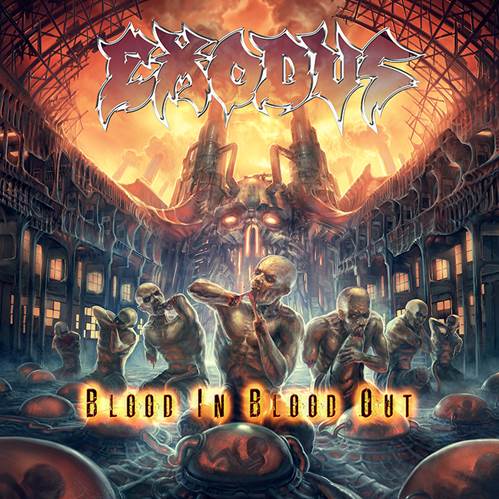
Album Review: Exodus - "Blood In, Blood Out"
The story of Exodus is becoming nearly as lengthy and weighty as the biblical book of the same name. Shoot, with the return of Steve ‘Zetro’ Souza to the ranks, there’s even a New Testament comparison, which is the obvious parallel to the parable of the prodigal son. However, the more things change the more they stay the same, and Exodus remains forever an integral piece of the fabric of American thrash, existing as both part of its living past and revitalized present.
To take a journey with Exodus is to take a guided tour of the influences and styles of old school speed metal and new school thrash, a pattern which offers little deviation for this new record, “Blood In, Blood Out.” The return of Zetro serves only to open the floodgates of thrash’s nostalgia, which means that Gary Holt and the other songwriters were free to channel their past and reinterpret it for the new millennium. The guitar riffs from end to end on this record run the gamut of metal standbys, indulging both the articulation and crunch of days gone by with the power that has so readily infiltrated modern metal.
Zetro, for his part, sounds slightly more mature than he has on previous records, but not in a bad way. His voice has more depth than when we last saw him don the Exodus mantle for “Tempo of the Damned,” but his raspy Cobra Commander facsimile remains idiomatically intact. There is some minor variance for the grunts and growls of opener “Black 13,” but by and large Zetro remains inimitably Zetro.
The most interesting part of “Blood In, Blood Out,” doesn’t necessarily have anything to do with Exodus at all, but rather with their the acts they’ve so long been surrounded by and associated with. While Holt makes sure that the long celebrated tempo of Exodus stays true to the norm, “Blood In, Blood Out” also incorporates the highlight reel of thrash to this point. “BTK,” which features Chuck Billy as a guest, also sees some of Holt’s Slayer work creep into the main riff. It prominently features the kind of open spacing that King and Hanneman used to build their band into an empire. Similarly, “Wrapped in the Arms of Rage,” could have been a contender for the final cut of Megadeth’s “Rust in Peace.” These are not detriments, but rather examples of a veteran band still having the desire to learn from those around them. Given those facts, is it any surprise that “Salt the Wound,” featuring a guest nod from Kirk Hammett (who was long ago an Exodus member,) sounds a little like an old Metallica track?
The general feel of “Blood In, Blood Out” is that Exodus wants you to enjoy Exodus both as a hallmark of thrash gone by and as a band still striving to make healthy, heavy metal in this brave new world. The title track, or “Collateral Damage” both thud along with a pulsing virility that belies the hunger of the musicians performing the songs. There is a chemistry here that makes the band just sound ‘right,’ a familiarity of legacy that even the best Rob Dukes efforts (and “Shovel Headed Kill Machine” is a great one to be sure,) lacked.
There’s a strange hitch in the giddy up, however. While not a deal breaker or a hang up that ruins the album experience, some of these songs are on the pudgy side. We talked earlier about “BTK” and “Wrapped,” but both of those songs are about a minute heavier than they need to be. There’s some musical largesse thrown around in different parts of the album, extra measures thrown in that slow down the album’s momentum. It’s a strange phenomenon for a thrash record, but it’s undeniable if you’re listening with intent.
Nevertheless, “Blood In, Blood Out” is a performance that Exodus should be proud of, though they hardly need to hear that from me. While not a comeback album in the true sense, it is a reunion album, and one that speaks to the ability of musicians to recognize the strengths in each other. Exodus has incorporated the lessons and successes of their entire history into this effort, and “Blood In, Blood Out” will stand as a proud part of the band’s enduring history.

